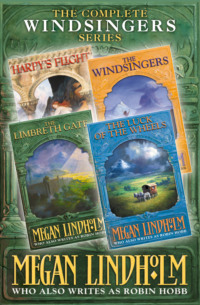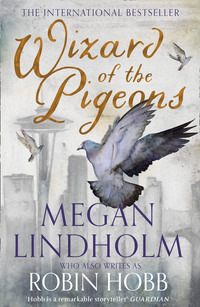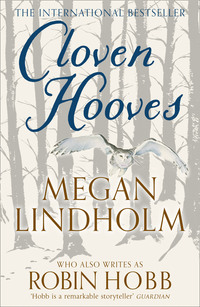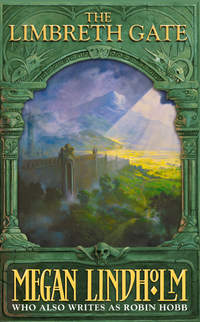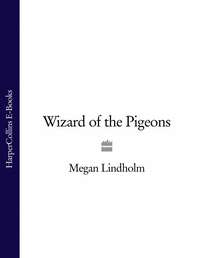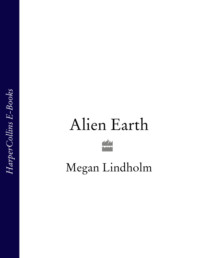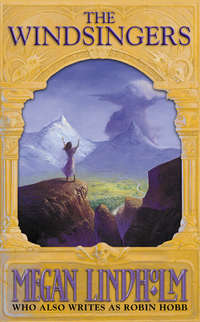
Полная версия
The Reindeer People
She shuddered. She knew she could never bear the touch of the shaman’s hands upon her. No matter how she stiffened her courage to endure it, she knew she would writhe and struggle against him. Better to be mounted by an animal than by one such as him. Better to flee these people, to be cold and hungry. Those things she could more easily stand. But the boy?
She looked down into the sleeping face stained with his father’s wildness. She could travel more rapidly without him. Carp could give the boy an easy life. He would not have to be forced to grow and change and learn. As the shaman’s apprentice, he would not be cuffed for staring, nor mocked for his awkwardness. Benu’s tribe would grow to prize his strangeness, to feel pride in their new shaman. It might be for the best.
Alone, her needs were simple. Since he had been born, he had made her life harder. She had gone from being a girl to being his mother. And he had never been an easy child. Even as a tiny babe, he had cried and struggled uncomfortably in her arms when she tried to cuddle him. No one would blame her. Not even Kerlew? She smiled ruefully. A season from now, he would probably be unable to remember her. What mother could love a child like that? Who would choose to be bound to such a burden? Her fingers reached, to push back a lock of his rough hair.
‘Come,’ she told him as his amber eyes fluttered open. ‘It is time for us to travel again.’
‘I have already been far this night,’ he murmured drowsily.
‘I doubt it not,’ she agreed. ‘But tonight we shall go farther still.’
CHAPTER TWO
She made her own trail, threading between trees just far enough apart to permit passage of the travois she dragged. Behind her, her long trail meandered through the forest, swerving and winding among the trunks but always bearing north. Benu’s folk had been bound southward. She knew it was foolish to move north at this time of year, but Carp would not expect her to be foolish. Even if he guessed that she had gone north, Carp could not follow them, not unless he was stubborn enough to leave Benu’s folk and travel alone. Perhaps, she thought as she plodded on, perhaps he could convince a few of Benu’s hunters to track her, for a day or so. But they would be unwilling to trail her for longer than that, for they were anxious to get themselves south, to their own winter grounds. And despite Carp’s power over them, they would be reluctant to go after his strange apprentice. No. Carp would be the only one with any reason to wish them back. She moved her fingers inside her mitten. Six days since she had left, and two falls of snow. If he had been following her, he would have caught her by now.
Safely out of Carp’s reach, she told herself. She waited to feel some lightening of her heart but only felt her burden dragging at her shoulders. Out of Carp’s reach, and into unknown areas and dangers. The straps of the travois cut into her flesh until she wondered if it was sweat or blood that damped her shoulders and back. Heavier than the drag of her tent and possessions was the weight of the task she had taken on. To do all, for herself and her son, in an unfamiliar territory devoid of human life. And to somehow change Kerlew, she reminded herself. To make him less strange, less difficult for other folk to understand To drive Carp’s strange notions out of his head and replace them with the skills he would need to live. To cleanse him of the magic Carp had started growing in him, just as she would cleanse a wound of an infection. Her determination set her teeth. She would do it. And until it was done, they would live alone and apart from other folk. No more Kerlew being hurt. No more hurting of others.
Her mind traveled back through the catalog of folk they had lived among. Before Benu’s hunters, there had been a river tribe. Tillu had liked them, enjoyed their cleanliness and the songs they sang as they tended their nets. She and her skills had been welcome among them, until Kerlew had come seeking her one evening, walking boldly into the women’s hut where no male ever ventured, into the midst of a womanhood ceremony. When Tillu protected Kerlew from the flung stones, they had both been driven from the river tribe with little more than the clothes on their backs. She flinched at the memory, and the others that crowded up behind it. Kerlew eating the jerky a hunter had set out as a spirit offering, Kerlew following a hunter of Oslor’s folk and springing every trap he had set, Kerlew noting aloud that Trantor’s son looked more like Edor than Trantor, to the great dismay of Trantor’s wife. Kerlew, Kerlew, always in the wrong place at the wrong time, with the wrong words in his mouth.
‘Kerlew?’ she called questioningly, realizing it was some time since she had last heard his voice. There was no answer. She halted, stilling the scrape of the travois’s poles over the frozen ground and thin layer of snow. Awkwardly she turned in her harness, looking back past her left shoulder. ‘Kerlew?’
‘I walk where no one else has ever walked before.’
She snapped her head about, found him just slightly behind her and to her right. ‘I thought for a moment I had lost you,’ she told him. She began walking again.
Some moments passed. Then, ‘Not me.’ The boy chuckled.
‘Not you what?’ she asked absently.
‘Not me you lost. Carp and Benu’s folk. We should find them soon?’
‘Maybe.’ She walked on a little faster. The first night they camped she had tried to make him understand why they had to leave Carp and Benu’s hunters behind. But as he realized she meant that they were running away from Carp, he had become agitated. The more she explained, the more upset he had become, swiftly reaching a point where he was not hearing anything she said. ‘Carp, Carp!’ he had wailed, rocking back and forth as he crouched on the frozen ground beside the small fire. ‘Carp! Carp!’ Until she had feared that if there were any of Benu’s hunters tracking them, the sound would attract them.
‘Hush, hush,’ she had comforted him, choosing any words that would quiet him. ‘Tomorrow, then, we’ll go back. Just be quiet now, Kerlew, and tomorrow we’ll go back to find them.’ And then, cruelly, because he wailed still, ‘Hush! Or a bear will hear you!’ That had silenced him, leaving him shaking with his pale eyes wide. ‘We will go back tomorrow,’ she had assured him, repeating the words until he slept. But when morning came, she had continued on her trek away from the hunters’ camp, Kerlew none the wiser. A few times each day now he asked when they would find Carp, and she gave him nebulous answers. Soon enough he would forget. She knew her son that well; nothing stayed in his memory for long.
‘I walk where no man has ever walked before!’
She glanced over at him. His smile was too wide, too wet. Sometimes she longed to slap it from his face, make pain chase away the vacuous, idiot smile and the foolish words. But she did not. She knew only too well the consuming self-disgust that would follow such an act. ‘You chose to keep him with you,’ she reminded herself. ‘You could have left him to Carp. You know you cannot beat sense into him.’ To Kerlew she said, ‘That’s silly. Just because you cannot see a trail does not mean that no man has ever walked there before.’
‘On this snow!’ Kerlew explained, smiling at the thought: ‘On this snow, no one has ever walked before, for the tracks would be here. This snow fell new last night, and the first tracks on it are mine. I walk where no one has walked before.’
‘Mmm.’ Tillu kept walking. There were times when the boy almost made sense, when she believed that, to him, his observations and statements followed some mysterious logic of his own. Carp’s shamanic instruction of the boy had made him more vocal; there was that she could say for it. Unfortunately, what Kerlew vocalized was the mystical gabble he had picked up from the old man.
She glanced across at her son. If only he would stand straighter, not drag his feet when he walked. If only his eyes would not wander and stare through things, he would not be such an awkward-looking boy. Not handsome, perhaps, but no worse than some she had seen take wives and build homes. Perhaps she could change the way he moved and spoke. Alone and apart from all others, perhaps he would turn once more to her, listen to her again. She would teach him, and this time it would be different. This time he would learn and grow. He would walk at her side through the forest and learn, not only her herbs of healing, but a hunter’s skills. He would learn silence, and swiftness, and skill with a bow. As he grew, he would stand tall and move as a man should move. And one day she and Kerlew would be hunting, and they would come across strange hunters. Kerlew would be standing straight, having just brought down a fine deer, and the hunter folk would smile at the sight of the tall young hunter, and there would be a young woman who would look at him just a little longer than was quite proper, and she would be the –
‘I’m hungry.’
The complaint broke the dream. Tillu sighed, both at her own foolishness and at Kerlew’s request. She had taken what supplies she could, but already they dwindled. The boy ate so much, so fast. She glanced again at him. Skinny. Perhaps she should give him the worm tea again.
‘I’m hungry,’ he repeated into her silence.
‘Soon.’ One more hill, she promised herself, and then, if the valley beyond it were a likely one, she’d stop for the night. This time she’d set up their tent and stay a few days. Carp’s seamed face came suddenly to her mind. Well, perhaps not just yet. Sleeping in skins was not so bad, it was not all that cold yet. Tomorrow she would push on for a day or so more, or perhaps three. She shivered. If Carp did come after them, with Benu’s hunters, her fate would be sealed. The shaman’s woman, prey to his withered hands and lined face, servant to his commands. To be touched by one such as that…She walked faster. She would not. That was all. She would not.
They crested a hill, and as they descended its other side, they passed abruptly into a forest. Here, for whatever reasons, the ancient forest fire had stopped. They stepped from a region of cottonwood, birch, and alders into the older pine forest. They went from trees that permitted light and snow to pass and settle on the forest floor to mossy-trunked giants that sealed out most of the light and snow. They moved through greenness, the air silent, almost opaque in the dimness. The poles of the travois hitched and bumped uncertainly over the deeper, softer moss and uneven blotches of snow. This part of the forest was older, more silent, generating a soft green gloom that seemed to well up from the dense moss and deep drifts of brown needles that peered from the scattered mosaic of snow that had penetrated the canopy of the forest.
There was a sense of peace to these huge trees. Their trunks rose straight and branchless for many man-heights before extending their needled limbs to block the sky. The underbrush was very sparse. Here, Tillu thought, I could set up my tent and the trees would keep most of the snow and wind away from us. I can see well in every direction; I would know if Carp came to seek us long before he was in reach of us.
‘…and she lay down on the deep moss to rest, but in the night it grew swiftly and covered her over, sealing her eyes and filling her mouth, and a tree, small and green, grew up from where her belly had been.’
Tillu shivered at the words and scowled at Kerlew. ‘What are you saying?’
‘A vision Carp showed me. Of a place like this, and how there came to be one small tree growing in the midst of many great ones. Like that one,’ he added, pointing to a young spruce, its needles pale green in the wash of the forest light.
It did grow from a hummock in the forest’s green floor. Tillu shook off the chill that came over her and set her shoulders more firmly to the chafing leather straps. ‘We have to go on. There’s no water here, and it would be hard for me to come up on game without it seeing me first. And there are too many trees to allow me a straight shot at anything.’ Suddenly the deep forest seemed a very poor place to set a tent.
‘We will go on.’ Kerlew nodded agreeably.
The tongue of the old forest was not wide. They were out of it as suddenly as they had entered it, the snow once more crunching under Tillu’s feet. The mellow green darkness of the great trees was left behind. The light of the young forest seemed too bright, the edges of the trees’ pale trunks too sharp to look at. She struggled up a new hill, the travois bumping against trees as it jerked along behind her. Kerlew walked behind her, taking advantage of the broken trail.
At the top of the hill she paused, taking in great lungfuls of the chill air. The sky, so bright only moments ago, was dimming now. Night would come early and swiftly. She glanced at the low-riding sun, trying to estimate how much farther they could safely travel today. The fire should be kindled before the darkness was complete. ‘Kerlew. Start picking up branches for tonight’s fire,’ she called over her shoulder. He muttered a reply.
‘What?’
‘Woman’s task to gather the wood. Not a fit task for a shaman,’ he reminded her calmly.
Tillu straightened suddenly in her harness. An anger like pain jolted through her. She twisted to look back at her son. Kerlew stared up at her, his eyes suddenly going wide. He shrank from her fury. ‘You are not a shaman!’ She spat out the words. She glared at him, her fury strangling her. No more words would come. ‘Pick up firewood!’ she snarled at last, turning away from him. The straps cut into her shoulders savagely as she jerked against her burden to get it moving again. She could hear him muttering sullenly behind her, but she also heard the snap of a dry lower branch broken from a tree. He would obey. She thought of Benu’s son, who would have run ahead with his bow in hopes of a rabbit or grouse. He had been no older than Kerlew. An alert boy he had been, his eyes large and bright, his hands already clever at carving. He had died of the bear plague. All the women had mourned his death. But Kerlew had lived. They had hated him for living.
The tears that stung her eyes were cold on her cheeks. She wanted suddenly to throw off her harness, to turn to Kerlew and hug him and tell him she was glad he had lived, that she loved him, would always love him, no matter what. But she could not. She had to get to the top of the hill, she told herself, and the boy would only have leaped away from her, struggled against her embrace. He did not need her tears and hugs. He needed her strength. She panted as she drew the travois over the crest of the hill. Standing still to breathe, she heard his muttering.
‘…and I will be treated better there, when I walk among the reindeer-folk. Yes, I will lead them all, and Tillu will be only a woman who must tend to the men.’
The valley ahead of her was a deep one, full of darkness and reaching trees. Tillu began the long descent.
CHAPTER THREE
Heckram stood alone on top of the pingo and looked back the way they had come. Winter had already claimed the tundra. Diffused moonlight seeped through the overcast and reflected off the snowy plains, giving a false aura of dawn to the scene. But dawn was many hours away, and wiser men than he were sleeping.
Cold emanated up from the frozen heart of the giant frost heave he stood upon. The dark earth covering it was carpeted with lichen and vegetation; they in turn were frosted by last night’s sprinkle of snow. The cold of the pingo’s heart tried to numb Heckram’s feet through his thin boots as the chill night leaned down on him.
The peak of the frost heave, a crest near sixty times the height of a man, lifted Heckram and made it seem that the tundra was a flat land, pale and featureless as the surface of a frozen lake. Distance and the uniform whiteness of the early snow cloaked its rolling swells and masked its long flat river valleys. The scouring of ancient glaciers had ground this part of the world into submission long ago. Ice had shaped it and mastered it and retained its dominance here. Freezes and thaws cracked its rocky bones and tortured its flesh into distinctive patterns, stripes and checks of earth separated by lines of ground frost. Even the long hours of daylight in the summer barely penetrated it. The skin of the tundra might thaw and bloom, but its heart was an icy secret.
A shallow blanket of powdery windswept snow covered all but the tallest grasses and brush of the tundra. There were no trees to stand tall and give a sense of distance to the vastness. The black line where the horizon met the night could have been but a step away, or mythically far. Clouds blanketed the sky this night; no stars betrayed the jest.
But Heckram had climbed the pingo to regain perspective, not lose it. He blinked his weary eyes and turned south, toward the foothills and forested mountains that were their winter goal. Ahead of them, perhaps two or three days as the herd traveled, they would find browse for the reindeer and fuel for winter fires. There, too, were the sod huts that offered as permanent a shelter as the nomadic herdfolk would ever know. In the winter camp, the older people and smallest children would shelter out the worst of the cold, while the herdfolk guarded against wolverines and wolves as their reindeer foraged on the snowy hillsides. For some, the camp ahead meant rest, and a time spent by the fires inside the kator. Some would slaughter their extra beasts and make blood sausage and boil marrow bones. The women would bow their heads over their ribbon looms, and some men would tell their children stories and make shadow plays with their rough hands against the walls of the sod huts. Some would take their excess wealth of animals and hides south to trade, while their relatives watched over their animals and families.
But not Heckram. While other men enjoyed the peace of the fireside, he would be raiding the wild herds, hoping to carry off the calves that had summered beside their mothers. His winter meat would be tough wild sarva or lean rabbit. While other women amused themselves with pretty-work, his mother would protect their animals from predators. What it all came down to, he reflected, were the beasts, tame and wild. If a man had enough reindeer marked with his mark, he lived well and easy. He had meat and hides to spare, and the time to hunt wolves and foxes for the lush winter furs the traders so valued. He had leisure to follow streams, looking for lumps of yellow amber washed loose by the spring floods. He had time to travel south through the hills, to walk proud among the southern traders and bring home the goods and stories of the south. He had time for the things that made life more than another day of survival. If a man had enough reindeer. Heckram did not.
The knowledge roiled bitterly through him. He lifted his eyes as if to see over the blocking hills and beyond them. Beyond them were more hills, and between them ran the trails that a good harke and a pulkor could travel easily. A man could load his pulkor with winter furs and lumps of amber from the spring-rushing streams and follow those trails. And if he did, he would come to the camps of the southern traders. They would make a man welcome with tongue-stinging wines from still farther south. A man could trade furs and amber for good bronze tools, or woven cloth of soft wool dyed to flower colors, or ornaments of gleaming gold, or flint worked as bronze, ground and polished with spiraling decorations. There men were tall and pale of eye and hair, as Heckram’s father and maternal grandfather had been.
And beyond the trading camps? There were tales. Beyond, men lived in tall houses with many rooms, an entire village in one shelter, and turned up the soil with wooden plows. They rode beasts with but a single toe on each foot, and brewed potent drinks from the seeds of grasses. The water of their lakes leaped and splashed by itself, and it was always summer. So he had heard. From his own father, so long ago. So he had seen, once, on a long-ago journey. Before the Plague Summer.
‘It’s useless to think on such things,’ Ristin would say, her head bent over her work, a small frown dividing her brows. ‘Stories and memories are fine for old folks and children. But you are neither, Heckram, and there are other things you should attend.’ His mother’s bright black eyes would send him a peering reminder that was also a rebuke.
Useless. But there were times when he felt hungry for them with a hunger worse than the starvations he had known. Times when the dreams of far places and better days were all that could sustain him. It was a hunger that ate at him, that set him apart from the herdfolk and made him a foreigner among his own people.
‘I want more than this,’ he heard himself say. The words didn’t impress the night, and he himself heard their foolishness. He closed his eyes, letting his mind wander back. When he had been small, his father had led their string of harkar. His mother had followed, leading her own string of reindeer oxen, and Heckram had ridden, clinging proudly to the pack saddle on the back of the most docile one. His clothing and the harness of their animals had been bright with ribbons of dyed sinew and grasses woven by Ristin’s clever fingers. He had worn woven shirts made with wool from the south, and his father’s knives had been of ground flint and gleaming bronze, not bone and horn. His mother had worn amber beads, and even a bronze armband. There had been extra animals and soft furs to trade south for luxuries, and plenty of rich reindeer cheese and blood sausages to share. Their tent had been a bright warm place in the winter evenings. His mother had helped him nock his own mark into the ears of his first calves, and he had tended them proudly. They had laughed often, in his childhood. Who would not dream after days like that?
But few of the others ever did. Or if they did, they seldom spoke of it, for on the heels of those memories came the other ones. The memories of the Plague Summer. Heckram shook his head, trying to dislodge those other memories that settled and burrowed into him as relentlessly as warble flies.
The preceding winter had been mild. He had played in the snow beneath the eaves of the forest, and watched his calves grow large and strong on the easy grazing. Spring had come early, to green the forest before the herdfolk had even begun their annual migration to the summer grounds. They had followed the wild herd coming down out of the forest-sheltered foothills into the wide tundra. The early warmth softened the tundra’s frozen face, thawing a shallow layer of the perpetually frozen soil beneath the hooves of the herd. The freed moisture and the brief warmth were all the vegetation of the tundra asked. Greens, purples, and golds with a scattering of blue, the hasty flowers of the tundra had leafed out and bloomed, so that the herd passed over a sweet carpet of lichens and mosses interspersed with the tiny bright flowers of the subarctic’s stunted flora. Then warm weather had descended upon the herd when it was still on the flats of the tundra, far from the upthrust of the Cataclysm with its cooling ice packs. The warble flies, the midges, and the mosquitoes had swarmed. They were far from the sanctuary of the glaciers. In the evenings the people had burned wet moss on their hearths to drive the insects away, but there had been no place for the animals to shelter from the stinging pests. The warble flies had driven many beasts to madness. The reindeer had galloped and fought the air as they were stung, pawing vainly at their nostrils when they inhaled the tiny, hateful creatures. The herdfolk had pushed on desperately, straining toward the Cataclysm and its blessed, cooling glaciers. Bewildered calves died in the unseasonable warmth. Full-grown animals galloped in maddened circles trying to escape their stinging tormentors until they fell of exhaustion. Yet the majority of the herd had reached the Cataclysm and moved up its steep sides, to relief in the winds off its permanent ice fields. The trials of the herdfolk should have been over. But of those reindeer that did survive to reach the Cataclysm’s height, where the stinging flies would not follow, many died anyway, coughing and choking and gasping in the sweet air of autumn.


